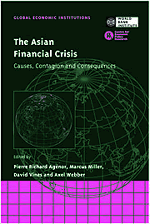Book contents
- Frontmatter
- Contents
- List of figures
- List of tables
- Preface
- List of conference participants
- Acknowledgements
- List of abbreviations and acronyms
- Introduction
- Part One General Accounts
- Part Two Theoretical Contributions
- 5 Capital markets and the instability of open economies
- Discussion
- 6 Volatility and the welfare costs of financial market integration
- Discussion
- 7 A theory of the onset of currency attacks
- Discussion
- Part Three Contagion
- Part Four Policy Responses
- Index
Discussion
from Part Two - Theoretical Contributions
Published online by Cambridge University Press: 26 February 2010
- Frontmatter
- Contents
- List of figures
- List of tables
- Preface
- List of conference participants
- Acknowledgements
- List of abbreviations and acronyms
- Introduction
- Part One General Accounts
- Part Two Theoretical Contributions
- 5 Capital markets and the instability of open economies
- Discussion
- 6 Volatility and the welfare costs of financial market integration
- Discussion
- 7 A theory of the onset of currency attacks
- Discussion
- Part Three Contagion
- Part Four Policy Responses
- Index
Summary
Chapter 5 by Aghion, Bacchetta and Banerjee (hereafter ABB) sheds new light on the largely debated issue of the effects of financial liberalisation on output volatility. ABB support the view that relation is positive, as some other contributions do. For example, McKinnon and Pill (1996) suggest that the removal of constraints on international capital movement is at least partially responsible for the Mexico 1994 and the Southern Cone crises. Chang and Velasco (1998a, 1998b) take a similar position concerning the Asian currency and financial turmoils.
McKinnon and Pill blame the excessive optimism of the banking sector. According to their view, it favours a large capital inflow that finances an (unsustainable) increase in consumption and resolves into devaluation. Chang and Velasco remark that financial liberalisations often involve large capital inflows with short maturities. Hence, when short-term obligations in foreign currency exceed reserves and available credit, banks become vulnerable: a creditors' wave of panic may render possible a self-fulfilling bank run and therefore a financial crash with real consequences.
The channel highlighted by ABB is remarkably different: the driving force in their model is simply wealth accumulation and the possibility of output fluctuations is ascribed to the presence of capital market imperfections. Entrepreneurs, to produce, need to purchase a tradeable input (capital) and a non-tradeable one (skilled labour, real estates or land). Total investment is constrained by the presence of capital market imperfections and hence borrowers, when the country is open to international capital movements, enjoy a ‘rent’ as long as the marginal productivity of capital is higher than the world interest rate.
- Type
- Chapter
- Information
- The Asian Financial CrisisCauses, Contagion and Consequences, pp. 190 - 194Publisher: Cambridge University PressPrint publication year: 1999

